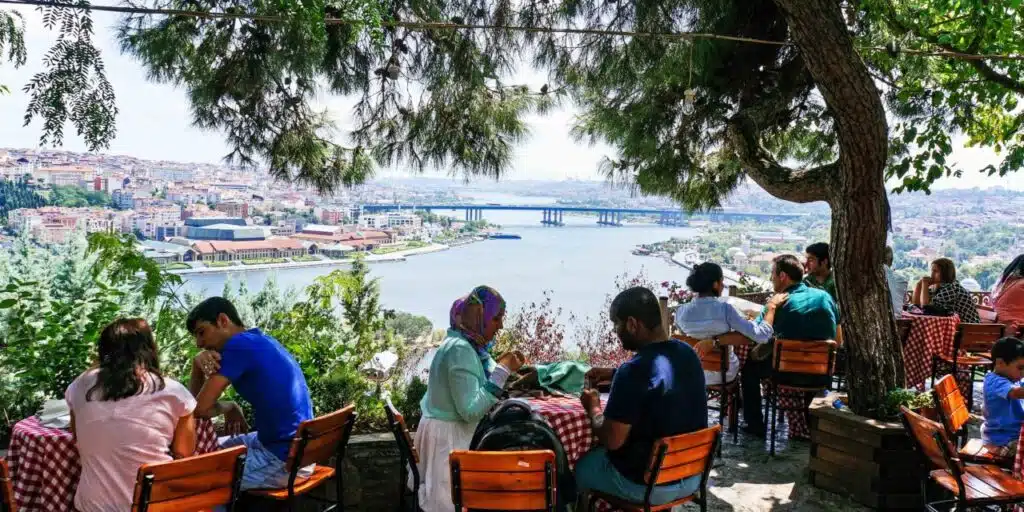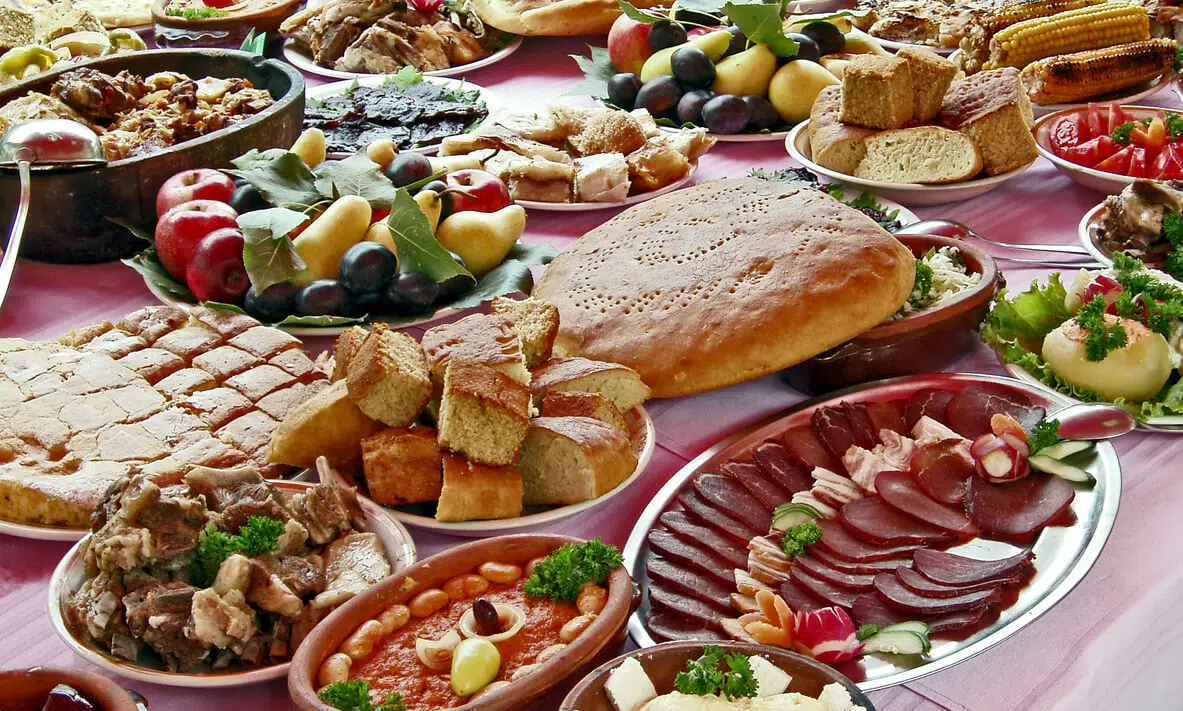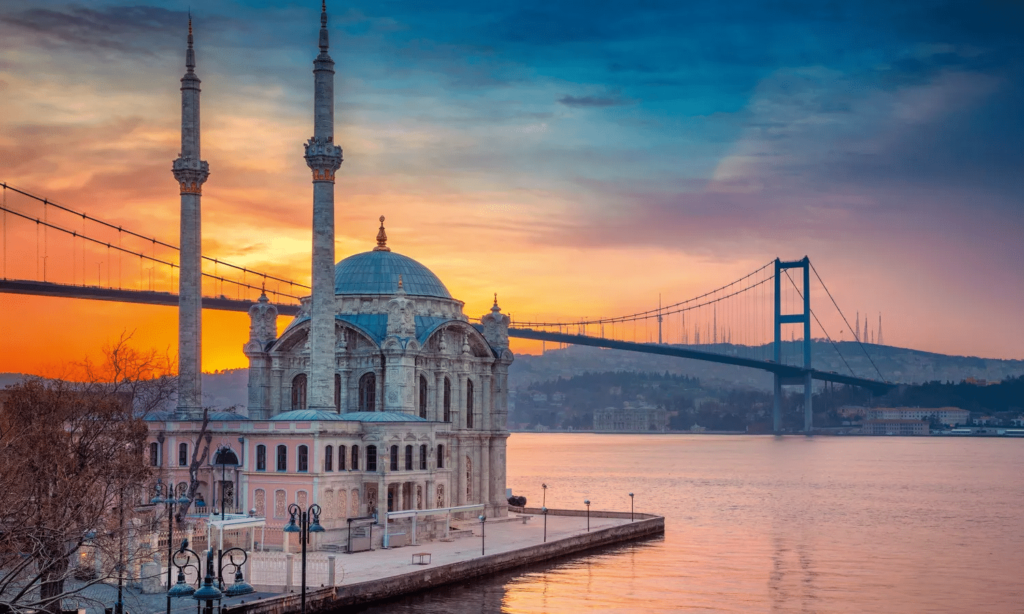Are you looking for excellent Turkish coffee in Istanbul? You are in the right place. Istanbul is one of the best coffee cities in the world. Turkish coffee culture has existed for centuries, and locals love it. Many areas in the city serve Turkish coffee.

©freepik.com
While you can try many delicious foods and drinks in Istanbul, Turkish coffee and delight are must-haves. If you love coffee, you will be impressed by the firm and flavorful Turkish coffee—unlike any other.
In this blog post, I will discuss various topics so you can choose the best Turkish coffee brands to take home. After tasting Turkish coffee in Istanbul, you will want to make it yourself.
What is Turkish Coffee?
Turkish coffee is a unique coffee made with very finely ground beans in a small pot called a cezve. It is brewed over low heat and served unfiltered. This brewing method is a “sent” part of Turkey’s culture. It began in the 16th century during the Ottoman Empire and is known worldwide as Turkey’s coffee brewing method. Turkish coffee’s brewing technique makes it unique, giving it a special flavor and texture.
To make Turkish coffee, you need to grind the beans into an ultra-fine powder, much finer than espresso. This grind creates a rich flavor in the coffee.
The process starts with mixing the ground coffee and water in the cezve. You heat this mixture slowly over low heat until it gets hot but does not boil. This helps form a frothy layer on top, the coffee’s signature foam. This careful heating is key to making a great cup of Turkish coffee.
Turkish coffee is different because of how it is prepared. Even though coffee beans are not grown in Turkey, the brewing method gives it a distinct taste. The roasted beans are ground into a fine powder, then mixed with cold water and sugar in the cezve. This is brewed slowly to create a thick foam that defines Turkish coffee.
It is served in small cups with a glass of water and a piece of Turkish delight. After drinking, coffee grounds will be at the bottom of the cup since the coffee is not filtered before serving.
Turkish coffee is strong, similar to espresso, but also thick and creamy because it is unfiltered. Although flavored versions of Turkish coffee are available, the traditional plain variety remains the most popular today.
Turkish Coffee Tradition
In 1517, the Ottoman Turks took over a small town in Yemen called Mocha and brought coffee beans back to their empire. They didn’t know this was the start of coffee becoming a favorite drink in the empire!
Turkish coffee is different from other types of coffee because it is cooked by boiling instead of brewing or mixing with hot water. It is usually made with aromatic Arabica beans and Brazilian Rio Minas beans.
The three leading drinks for Turks are rakı, ayran, and Turdidn’toffee. Each drink has unique features, but making Turkish coffee is especially important to our culture. There are traditions about how to serve it. Turkish coffee has a strong taste and is served in small espresso cups. A fun way to know if it is cooked correctly is to say it should be foamy enough for a buffalo not to sink.
People usually drink coffee after meals or when guests visit a Turkish home.
A glass of water is served with Turkish coffee. Drink the water before the coffee to cleanse your palate. This helps you enjoy the wonderful flavor of the coffee.
Turkish coffee is often served with Turkish delight, a sweet treat eaten after the coffee. If a guest eats the Turkish delight first, it shows they are hungry. The host can then offer them a meal without asking if they want food.
A Turkish saying means, “A single cup of coffee is remembered for 40 years.” People in Turkey enjoy drinking Turkish coffee and having their fortunes told by the coffee grounds left in the cup. This practice is part of Tasseography, which interprets the patterns of tea leaves and coffee grounds.
Turkish coffee culture is recognized as an intangible cultural heritage.
Turkish coffee culture and tradition were added “to UNESCO’s List of Intangible Cultural Heritage 2013. This recognition highlights the unique way Turkish coffee is prepared, brewed, and enjoyed and its essential role in Turkish social customs.
You start by finely grinding freshly roasted coffee beans to make Turkish coffee. Next, mix the ground coffee, cold water, and sugar in a spUNESCO coffee pot and brew it slowly to create a foam layer. You serve the coffee in small cups, usually in coffee houses where people gather to talk and read.
Turkish coffee is a part of daily life celebrated in literature and songs. It represents friendship, hospitality, and elegance. People often enjoy coffee together on special occasions like engagement ceremonies and holidays.
The customs surrounding Turkish coffee are passed down from family members through watching and participating. After finishing the coffee, the leftover grounds in the cup can be used to tell fortunes. Turkish coffee is a beloved part of Turkish heritage, and its rituals make it an essential element in many celebrations.
The importance of Turkish Coffee in Turkish culture
Turkish coffee is a beverage and a cultural staple in Turkish society. Like tea, it is a daily drink in homes and offices. Almost all restaurants and cafes offer Turkish coffee, often as a complimentary drink after a meal. Unique coffee houses are also available where people gather to converse, share news, and read books, further cementing the drink’s cultural significance.
More than just a drink, Turkish coffee symbolizes hospitality, friendship, refinement, and entertainment. It is a social catalyst, bringing people from all walks of life together. An invitation for coffee among friends often leads to intimate conversations and the sharing of daily life. Turkish coffee also plays a drink’s role in social occasions, such as holidays and engagement ceremonies, where family members share knowledge and rituals informally.
The grounds left in the empty cup are often used to tell a person’s fortune. Turkish coffee is regarded as part of Turkish cultural heritage and is celebrated in literature and songs. It is an indispensable part of ceremonial occasions.
How is Turkish Coffee Made?
Turkish coffee is prepared differently from other coffee-making methods. The coffee beans are ground to a fine powder, almost like flour. This fine grind is essential for the drink’s texture and flavor.
Coffee is brewed in a small pot called a Cezve, often with added sugar, according to the drinker’s preference. It is then boiled until it froths, sometimes multiple times, creating a thick, foamy drink. The coffee grounds settle at the bottom of the cup, giving the drink its characteristic dense and earthy flavor.

Pierre-Loti-Istanbul ©rustytraveltrunk.com
The Most Popular Places for the Best Turkish Coffee in Istanbul
Here, we present a few of the most popular places to drink traditional Turkish coffee. However, you have to say that everyone has their own taste. You might find better coffee in a coffee shop that needs to be listed on any of the world’s best coffee lists. Noteworthy is, however, to know your taste. For us, it is best to find a local coffee shop somewhere in the old town, away from all the most popular places where nobody speaks English.
It might be a more elegant place, but you will have an authentic experience, which matters most to us.
But here are some of the world’s best coffee shops, according to coffee experts and well-known travel bloggers. Let’s check them out, shall we?
Mandabatmaz Coffee House
Nestled in the lively streets of Istanbul, Mandabatmaz Cafe is a cherished gem renowned for its timeless appeal and dedication to serving authentic Turkish coffee. Since its establishment in 1967, this iconic cafe has captivated coffee enthusiasts with its vintage decor and commitment to preserving the art of traditional Turkish coffee brewing.
It is located on the well-known Istiklal Street and is a trendy spot for anyone who’d love to have a cup of Turkish coffee during the day. Mandabatmaz is an old coffee house still stylish and has a fantastic brand.
Pierre Loti
Pierre Loti is a popular café in Istanbul with a great view of the Golden Horn and charming French-style decor. It gets busy, especially on weekends, so visit during the weekdays to avoid long wait times.
This famous café is a perfect spot to relax away from the city’s hustle. You can enjoy one of the best Turkish coffees there. The fresh air and beautiful scenery at Pierre Loti Hill make sipping coffee even better.
To reach it, take a short car ride from Eyüp station. For a quieter experience, go on weekdays for shorter lines.
Fazıl Bey in Türk Kahvesi
Located in the historical district of Kadikoy, Fazil Bey’s Turkish Coffee has been serving authentic Turkish coffee since 1923. The aroma of their carefully selected and freshly ground beans draws you in, and you can witness the roasting and brewing process firsthand. The result is a delightfully creamy and aromatic cup of coffee. Whether you enjoy it on-site or take some freshly roasted beans home, Fazil Bey’s Turkish Coffee offers an unforgettable experience for coffee enthusiasts.
The name means “Turkish coffee of Mr. Fazıl.” As the name suggests, Mr. Fazıl created a unique recipe for his delicious Turkish coffee in the 1920s. Today, his family keeps this tradition alive. Roasting and grinding raw coffee to achieve the classic Turkish flavor is a complex process that relies on skill and experience. The roasting, in particular, requires personal mastery to bring out the unique taste of the coffee. They do not support producing coffee using industrial methods and believe that making Turkish coffee needs care and love. The” traditional machines they use have been running for many years and continue to provide the same unique taste from their early days. So, if you are on the Asian side of Istanbul, try this authentic experience. Since it is a popular place, you might wait 15-30 minutes for a table.
Kurukahveci Mehmet Efendi
Located near the Spice Bazaar in Eminonu, Kurukahveci Mehmet Efendi is a renowned coffee shop with a rich history dating back to 1871. The central branch boasts a small yet charming shop where visitors often find long queues, a testament to its high-quality coffee. The shop has gained popularity for its classic Turkish coffee and original recipes created by Dede, the experienced mixologist known as ‘Grandpa.’
Interesting: Turkish Coffee Test- A Marriage Tradition
In Turkish culture, coffee takes center stage in marriage traditions, symbolizing hospitality and connections. The groom’s family visits the bride’s family to formally meet and discuss the couple’s future, and the bride-to-be prepares a Turkish coffee for everyone in attendance. However, there’s a playful twist: one cup—intentionally prepared with salt instead of sugar—is served to the groom. His reaction to the salty coffee is closely observed as it tests his patience, tolerance, and sense of humor. This endearing custom highlights the profound social significance of Turkish coffee, turning a simple gesture into a meaningful ritual that brings families together.
FAQ
What is Turkish coffee called in Turkey?
Turkish coffee is called ‘Türk Kahvesi’ in Turkey. The meaning is the same: Turkish coffee””Meet and discuss the couple’s future.”
Where do they drink Turkish Coffee?
Everywhere. Turkish people drink Turkish Coffee daily at their houses, offices, cafes, and restaurants after a meal… Turkish coffee is an indispensable part of Turkish daily life with tea.
What is the etiquette of Turkish coffee?
Turkish coffee is often served with a tiny sweet morsel, such as a piece of lokum (Turkish delight), and a glass of water on the side. Sip the water to cleanse your palate while waiting for the coffee to cool slightly and the grounds to settle to the bottom of the cup.
Is Turkish coffee healthy?
Since it’s unfiltered, Turkish coffee contains higher levels of the beneficial compounds in traditionally brewed coffee. Coffee beans typically contain healthy compounds like chlorogenic acids, but you may lose them if you filter coffee grounds. So, unfiltered Turkish coffee is more nutritious than other filtered coffees.
Which brand of Turkish coffee is best?
If you want to take Turkish Coffee home, go for Kurukahveci Mehmet Efendi. It is the most popular Coffee among Turkish people. You can find it in markets, but I prefer buying from its Eminonu store.
Is it healthy to drink Turkish Coffee every day?
It is good if you are good with caffeine and your doctor didn’t warn you about coffee consumption. Turkish people generally drink Turkish coffee every day.
How do they drink Coffee in Turkey?
In Turkey, people put ground Turkish coffee, Coffeeater, and some sugar in a single pot and boil it without mixing. The coffee will eventually, and since they don’t filter, the coffee ground will be at the bottom of the cup.
Do you drink all of the Turkish coffee?
No, coffee the grounds at the bottom. Only drink the drinkable part.
Do you drink all of the Turkish coffee grounds?
No, you only drink the liquid part of the Turkish coffee and leave the grounds in the cup.
Why is Turkish coffee served in coffee cups?
Turkish coffee is served in a small cup because it is strong and, like espresso, contains high caffeine. However, you can always order double Turkish coffee in cafes.
Conclusion
Turkish coffee is more than a drink or a unique brewing method; it’s a cultural phenomenon transcending time and borders. From its historical origins in the Ottoman Empire to its recognition by UNESCO as an Intangible Cultural Heritage of Humanity, Turkish coffee represents a blend of rich tradition, community, and craftsmanship. Its unique preparation method, paired with meaningful rituals like marriage customs and fortune-telling, weaves it deeply into Turkish life’s social and cultural fabric.
Turkish coffee symbolizes hospitality, connection, and enduring heritage, whether served in a traditional cezve or made with modern appliances. Each cup tells a story about its centuries-old practices, shared moments, and a universal language of warmth and friendship. By embracing Turkish coffee, one embraces a tradition that invites us to slow down, savor the moment, and create lasting bonds over this beloved brew.
Take a look at

The Finest Day Trips from Athens
When you visit Athens, you don’t just aim to see the city but also some other sights because you never

Best Serbian Food to try in Belgrade
Are you planning to travel to Belgrade? In that case, we present our guide: Best Serbian Food to try in

Istanbul’s major attractions
Why have we decided to share the article ” The Top Istanbul Attractions” with you? Firstly, Istanbul is a magical
